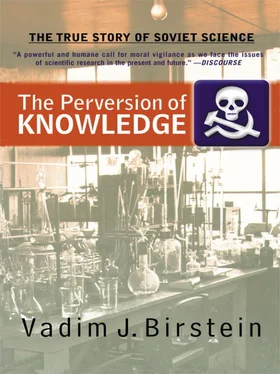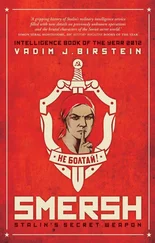Parin, Vasilii(1903–1971), physiologist. Graduated from the Medical Faculty of Perm University (1925); later in the Physiology Department of this faculty (1928–1932). Chair of the Normal Physiology Department at the Medical Institute in Sverdlovsk (now Yekaterinburg) (1933–1940), rector of the First Moscow Medical Institute (from 1941), and deputy commissar of health (in charge of science) and plenipotentiary of the Commissariat of Health in charge of anti-epidemic actions (from 1942). A member (1944) and secretary academician of the Medical Academy (1944–1947; 1957–1960). Wrote the statutes of this academy. Arrested in 1947 in connection with the Roskin-Klyueva “case.” Sentenced on April 8, 1948 to 25 years’ imprisonment as an “American spy.” Kept in Vladimir Prison. Released in November 1953. Head of the Physiology Laboratory at the Institute of Therapy (1954–1956), director of the Institute of Normal and Pathologic Physiology (1960–1971) and the Institute of Medical-Biological Problems (1965–1969). Academician (1966), vice president of the Medical Academy (1967–1971). Party member from 1939.
Pavlov, Ivan(1849–1936), physiologist, Nobel Prize (1904) winner, created the theory of conditional reflex and pioneering studies relating human behavior to the nervous system. Graduated from St. Petersburg University (1875) and the Military-Medical Academy in St. Petersburg (1879). Head of the Physiology Department there (1895–1924), director of the Institute of Experimental Medicine (1891–1936), and director of the Academy Institute of Physiology (1925–1936). Full academician (1907). An outspoken critic of the Bolsheviks. Unfortunately, at the end of Pavlov’s life and especially after his death in 1936, the Soviet propaganda presented him as a scientist who became a supporter of the Bolshevik regime.
Pervukhin, Mikhail(1904–1978), state figure. Joined the Party in 1919. Commissar (minister) of the Electric Power Industry (1939–1940; 1953–1954), deputy chairman of the Council of Commissars/Ministers (Sovmin) (1940–1944; 1950–1953; 1953–1955), first deputy chairman of the Sovmin (1955–1957), minister of chemical industry (1942–1950), and minister of the medium machine building (i.e., atomic industry) (April–July 1952). Chair of the State Committee on Foreign Economic Affairs of the Sovmin (1957–1958), then ambassador to East Germany (1958–1963). Head of a directorate within the People’s Industrial Council (1963–1965) and head of a department within Gosplan (1965–1978) (Naumov and Sigachev, Lavrentii Beria , p. 474).
Peters, Yakov(1886–1938), a founder-member of the VCheKa/OGPU Collegium. Chairman of the VCheKa (July–August 1917). During the late 1920s–1930s, chairman and later a member of the Party’s Central Control Commission, collegium member of the Commissariat for Workers’ and Peasants’ Inspection and its head for the Moscow Region, first deputy chairman of the Moscow City Soviet and of the Moscow Regional Soviet’s Executive Committee. Arrested on November 26, 1937, sentenced to death on April 25, 1938, and shot the same day (Leggett, The CHEKA , pp. 267–268; Yeremina and Roginsky, Rasstrel’nye spiski , p. 318).
Pitovranov, Yevgenii(1915–?) headed the Second MGB Main Directorate (1946–1951), deputy MGB minister (1951). Arrested after the fall of Abakumov, but released soon in December of 1952. Head of the new First (Foreign Intelligence) MGB Directorate (December 1952–March 1953). Later reduced to deputy head of the Counterintelligence (Second) MVD Directorate. From 1953–1957, at high KGB positions in Germany. Head of the Fourth KGB Directorate (1957–1960), then head of the High School of the KGB (1962–1966). In 1966, transferred to the reserve (Parrish, The Lesser Terror , p. 311–312; Nau-movand Sigachev, Lavrentii Beria , p. 475; Murphy et al., Battleground Berlin , pp. 44–45, 463).
Platonov, Sergei(1860–1933), historian. Academician (1920). Director of the Pushkin House in Leningrad, the Institute of Russian Literature, and the Academy Library. Arrested on January 12, 1930, together with two daughters. On August 8, 1931, sentenced to 5-year exile. Died on January 12, 1933, in exile in the city of Samara.
Pokrovsky, Mikhail(1868–1932), historian. Turned to political activity after the Bolshevik Revolution and became the most trusted Party leader in humanitarian sciences. Headed the Communist Academy, Institute of History, Institute of Red Professors, and Society of Marxist Historians, and was a member of the editorial boards of the journals Marxist History and Class Struggle . Died of cancer in 1932.
Polyansky, Yurii(1904–1993), protozoologist, anti-Lysenkoist. Graduated from Petersburg University. At the Leningrad Pedagogical Institute (from 1928), chair of the Invertebrate Zoology Department (from 1933). Also at the Laboratory of Invertebrate Zoology of the Petergoff Biological Institute within Leningrad University. Later chair of the Animal Genetics Department of Leningrad University. In 1941, volunteered for the army. Deputy rector, then acting rector of Leningrad University (1945–1948). Dismissed after Lysenko’s triumph in 1948. At the Murmansk Biological Station (1949–1955), chair of the Invertebrate Zoology Department at Leningrad University (1955–1982), head of the Academy Laboratory of Cytology of Unicellular Organisms in the Institute of Cytology (1982–1987). Corresponding member of the academy, president of the Society of Protozoologists and honorary member of many international societies. Two Lenin Awards, Hero of Socialist Labor.
Poskrebyshev, Aleksandr(1891–1965), Stalin’s secretary. Joined the Bolshevik Party in 1917. Head of the Administration Directorate of the Central Committee (CC) (1922–1923), deputy secretary of the CC (1924–1929), head of the Secret Department of the CC (1929–1934), head of the Special Sector of the CC (i.e., Stalin’s secretariat) (1934–1952), secretary of the Presidium and Bureau of the Presidium of the CC (1952–1953). According to Nikita Khrushchev, Stalin “always dictated to Poskrebyshev, and then Poskrebyshev would read it back to him.” Helped Yezhov and Malenkov to draw up lists of victims in 1937–1938. Member of the CC (1939–1953). Retired in 1953 (Nau-movand Sigachev, Lavrentii Beria , p. 477; Khrushchev Remembers , pp. 292–293).
Prezent, Isaak(1902–1969), philosopher and Trofim Lysenko’s main theoretician. Graduated from the Faculty of Social Sciences of Leningrad University (1926). Joined Lysenko in 1928. Professor of Leningrad University (1931–1937; 1943–1952). Played the main role in staging official “disputes” and conferences against anti-Lysenkoists, the August 1948 Session of the Agricultural Academy (VASKhNIL). Appointed member of the VASKhNIL (1948). Chair of the Department of Darwinism at Moscow and Leningrad Universities and Dean of the Biology Faculty of Moscow University (1948–1952).
Prokofiev, Georgii(1895–1947), lawyer, graduated from Kiev University. Joined the Party in 1919, and the VCheKa Foreign (Intelligence) Department (INO) in 1920. Deputy head of the GPU Abroad Department of the INO (1921–1922) and of the Special Bureau of the OGPU on Deportation of Anti-Soviet Elements of the Intelligentsia (1922). Deputy head of the INO (1922–1924), head of the OGPU Information Department (1924–1926), head of the OGPU Economic Directorate of the OGPU/NKVD (1926–1931), deputy chairman/commissar of the OGPU/NKVD (1932–1936). In 1936, demoted to deputy commissar of communication. Arrested on April 11, 1937, tried and shot on August 14, 1937. Not rehabilitated (Petrov and Skorkin, Kto rukovodil NKVD , pp. 349–350).
Читать дальше











